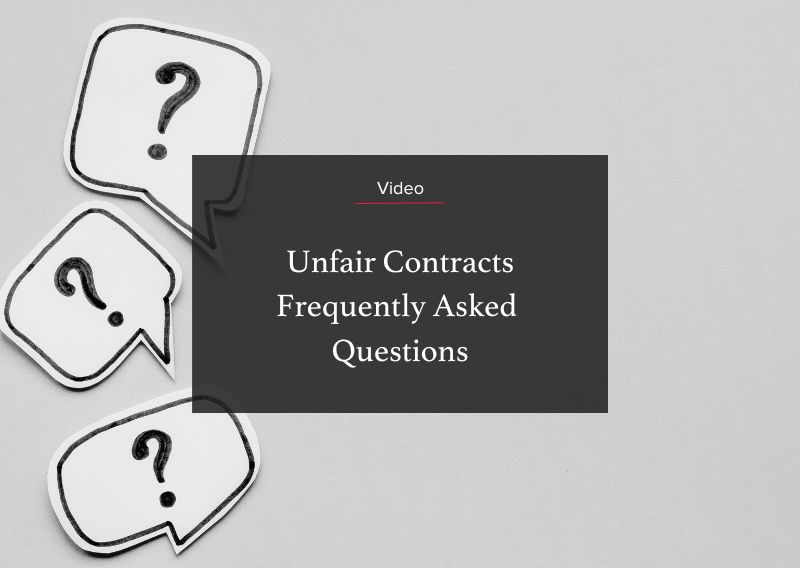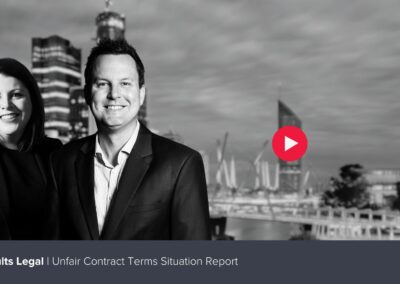As the changes to the Unfair Contract Terms Regime have now come into effect, many of our clients have been seeking clarification on what this means for their businesses.
With the new legislation in place, it’s important for companies to fully understand their obligations and ensure they are compliant.
Over the last few months, we have received a range of questions regarding the Unfair Contract Terms Regime, from what constitutes an unfair term to how to draft contracts that align with the new regulations.
In the video below, Special Counsel Robert Shepley has provided answers to some of the most frequently asked questions, providing clarity and guidance on navigating this complex area of law.
Please reach out if you have any other questions you would like us to answer about this significant change.
Questions covered in the video and below include:
-
- Do these changes impact existing contracts?
- Does the legislation cover employment contracts?
- The regime applies if one party to the contract has fewer than 100 employees. What happens if you are part of a group or larger entity?
- We have a price change clause that can be adjusted based on our own cost movements. Would this be considered unfair?
- Is it possible to add a clause stating that any legally unfair clauses are removed, while all others remain enforceable?
- Is each term deemed unfair liable for a fine, or is the contract treated as one breach?
- Can we wait and see how the courts treat these changes before we change/update our contracts?
Frequently Asked Questions
It’s important to note that this is general advice and does not take into account your circumstances or industry.
For further information or to discuss your specific circumstances, please contact us for a no-obligation consultation.
Do these changes impact existing contracts?
The changes will be in effect for contracts entered into after November 9th, 2023.
However, some existing contracts may be incorporated into the new regime, depending on their structure and any new orders placed and accepted after the specified date.
Does the legislation cover employment contracts?
The focus of the regime is consumer contracts, and importantly, small business contracts. Employment and other types of contracts have their own regime separately.
The regime applies if one party to the contract has fewer than 100 employees. What happens if you are part of a group or larger entity?
One of the key criteria for determining the applicability of the new regime to small business contracts is the employee headcount, along with an annual turnover of less than $10 million. Notably, these thresholds apply not only to your business but also to any party involved in the transaction.
And for that reason, having separate rules for small and large businesses is challenging due to the uncertainty of identifying the counterparty.
We have a price change clause that can be adjusted based on our own cost movements. Would this be considered unfair?
Price changing clauses can be complex. When appropriately drafted, they should provide sufficient clarity regarding the base price, while allowing for certain variables that may lead to price adjustments.
However, it is common to come across price variation clauses that were previously written too broadly, granting excessive discretion to suppliers. This was often the case prior to the unfair contract terms regime.
Price change clauses can still be effective and included in contracts, but it is crucial to redraft them to ensure specificity and limit interpretation.
Is it possible to add a clause stating that any legally unfair clauses are removed, while all others remain enforceable?
When drafting contracts under the unfair contract terms regime, it is crucial to adopt a different strategy than what was previously employed. It is no longer acceptable to include a series of potentially unfair clauses, accompanied by a clause stating that they do not apply if deemed unfair or in violation of the law. Instead, it is imperative to eliminate such clauses altogether.
With the current regime, the inclusion of unfair contract terms, regardless of intent to rely on them, constitutes a contravention. Therefore, clients must now approach contract drafting strategically, determining the essential clauses required while ensuring they are designed to minimise the risk of being unfair from the outset.
Is each term deemed unfair liable for a fine, or is the contract treated as one breach?
One crucial concern regarding the penalty system in place for the regime is the existence of penalties per contravention.
Therefore, it is not simply a matter of a single penalty for the entire contract. If there are 10 clauses that are deemed unfair, multiple contraventions become a potential risk.
Can we wait and see how the courts treat these changes before we change/update our contracts?
When the unfair contracts regime was first introduced several years ago, there was a wait-and-see approach to understanding which terms were deemed fair and which terms were not.
However, in recent years, there has been more judicial certainty, particularly due to key cases like the Fujifilm case, which provided valuable insights into fair and unfair clauses.
With this information, we can now draft terms with more confidence, although there may still be some uncertainty, particularly in charging clauses.
Nevertheless, we have enough knowledge to draft contracts that are as compliant as possible while considering commercial realities.






